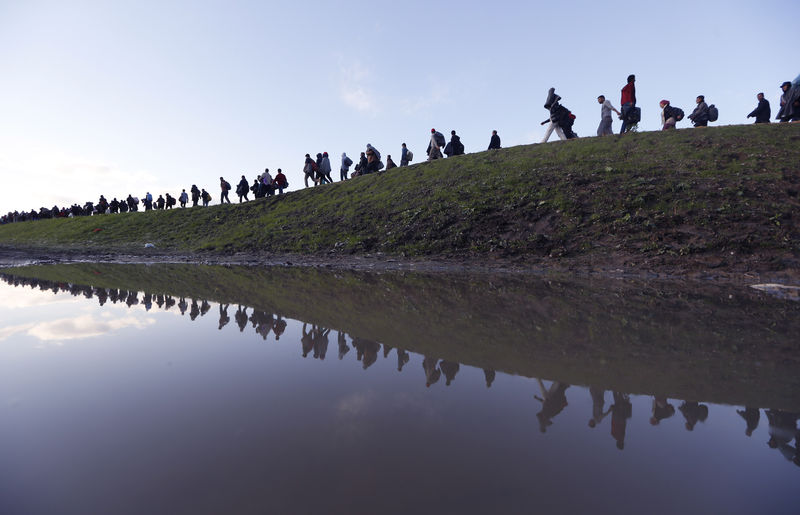By Tom Körkemeier and Paul Taylor
BRUSSELS (Reuters) - European Commission President Jean-Claude Juncker has called an extraordinary meeting of several European leaders on Sunday to tackle the migrant crisis in the western Balkans as thousands trying to reach Germany are trapped in deteriorating conditions.
The Commission said in a statement on Wednesday that Juncker had invited the heads of state or government of Austria, Bulgaria, Croatia, Macedonia, Germany, Greece, Hungary, Romania, Serbia and Slovenia, plus key organisations involved.
"In view of the unfolding emergency in the countries along the western Balkans migratory route, there is a need for much greater cooperation, more extensive consultation and immediate operational action," the European Union executive said.
The mini-summit's aim was to agree "common operational conclusions which could be immediately implemented".
It comes as crowds of refugees and other migrants camp by roads in western Balkan countries in worsening autumn weather after Hungary sealed its borders with Serbia and Croatia, causing a chain reaction in other overwhelmed states.
Slovenia passed legislation on Wednesday to give the army more power to help police guarding the state border - which forms the outer edge of the passport-free Schengen zone - as refugees streamed in from Croatia on the way to Austria.
EU diplomats said German Chancellor Angela Merkel, under domestic pressure over an influx of hundreds of thousands of asylum seekers, was the driving force behind the latest meeting, just 10 days after the last full EU summit on migration.
Some diplomats voiced concern that Berlin was deepening divisions in the 28-nation bloc by pressing for a permanent mechanism for relocating refugees among member states, which several governments saw as an open-ended commitment and were determined to resist, at least until the influx can be limited.
Peter Altmaier, Merkel's chief of staff and coordinator for the refugee crisis, said the aim of the summit was to address the "untenable" situation in which refugees were passing unhindered through the Balkans and north to Germany.
"It can't be that every country simply allows the refugees through," he told public broadcaster ZDF. "Therefore the goal is to agree on common steps so that all countries get relief and that the refugees are treated humanely on their path through Europe."
DIVIDING LINE
A dividing line is emerging between governments that see the crisis primarily as a security issue requiring stronger action to control the EU's borders, stem the flow of migrants, send back those not entitled to asylum and pay other states if necessary to keep them at bay, and those that see it above all as a humanitarian integration challenge.
Diplomats said Tusk reflected the security concerns more strongly, while Juncker saw the EU's humanitarian values at stake. Berlin and Commission officials are also sceptical of the chances of preventing desperate people from reaching Europe.
Last week's EU summit agreed on a range of measures to strengthen external border protection and offer financial incentives to Turkey and other nations to keep refugees on their soil and deter them from heading to Europe.
The new meeting appeared to be an effort by Juncker and Merkel to raise pressure on central and southeast European states to cooperate among themselves in managing the migration flow in a more humane way and end a series of unilateral actions that have raised political tensions.
But Timothy Kirkhope, a British Conservative who is handling the European Parliament's work on migrant relocation, urged Juncker to invite all EU leaders.
By inviting Germany alone of the main destination states, he said, "I fear that you will give many other EU countries ... the strong impression that decisions are being made by a handful of countries that will have lasting effects in all EU member states".
The meeting will take place from 4 to 7 p.m. (1500-1800 GMT) on Sunday, followed by a working dinner and will also involve United Nations High Commissioner for Refugees, Antonio Guterres, the European Asylum Support Office and EU border agency Frontex.

European Council President Donald Tusk was invited but officials said it was not yet clear he could attend. Luxembourg was invited as the current chair of EU ministerial councils.